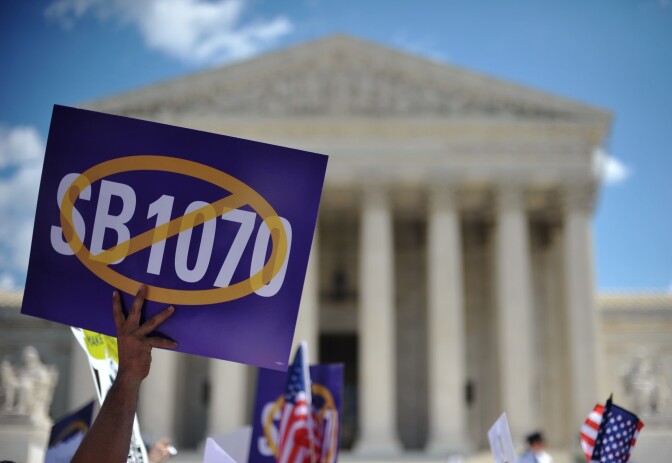This story is free to read because readers choose to support LAist. If you find value in independent local reporting, make a donation to power our newsroom today.
This archival content was originally written for and published on KPCC.org. Keep in mind that links and images may no longer work — and references may be outdated.
LA drops Arizona from its list of boycotted states

City leaders in Los Angeles decided this week to end their economic boycott of Arizona.
The city council originally enacted restrictions on travel and business with Arizona in 2010 to protest a the passage of SB 1070. The state's law included tough and controversial immigration measures, such as allowing officers to make arrests without a warrant when they suspected an immigrant had committed a deportable offense, and making it a crime for unauthorized immigrants to seek work in the state.
In a 2012 decision, the Supreme Court struck down those provisions but left other parts of the law in place. With the law significantly weakened at this point, Los Angeles has determined its boycott is no longer needed.
So, did the city's boycott have any real economic impact on Arizona? Dennis Hoffman, an Arizona State University economics professor, said the answer to that is probably "unknowable." But he thinks all the public attention did nothing good for Arizona's reputation.
"I think Arizona was tarnished by SB 1070 and published boycotts probably fueled the ill will," he said in an email.
It's hard to know if the city's boycott took a major bite out of Arizona's economy because, for one thing, the boycott wasn't very strict. City workers still got permission to travel to Arizona in cases where the council decided not going would "seriously harm the city's interests."
Proprietary departments like Water and Power, the Harbor and the Los Angeles World Airports Department were not subject to the city's policy, and exemptions were carved out for other contracts. Which meant the city continued spending millions of dollars each year on business with entities in Arizona.
"Between the years of 2012 and 2015, there was approximately $38 million that had been paid," said Felipe Chavez, a legislative analyst for the city.
According to a 2016 report written by Chavez, about $27.3 million of that spending came from the city's proprietary departments. When Chavez analyzed the city's pre-boycott spending in 2010, he found Los Angeles was paying about $7.7 million for business with Arizona-based companies, not including proprietary department contracts.
Los Angeles may have ended its boycott against Arizona, but it continues to restrict business with other states. In 2016, the city council voted to cut business ties with North Carolina and Mississippi over laws seen as anti-LGBT.
There are also government travel restrictions on the state level. California currently bans state-funded and state-sponsored travel to eight states.








